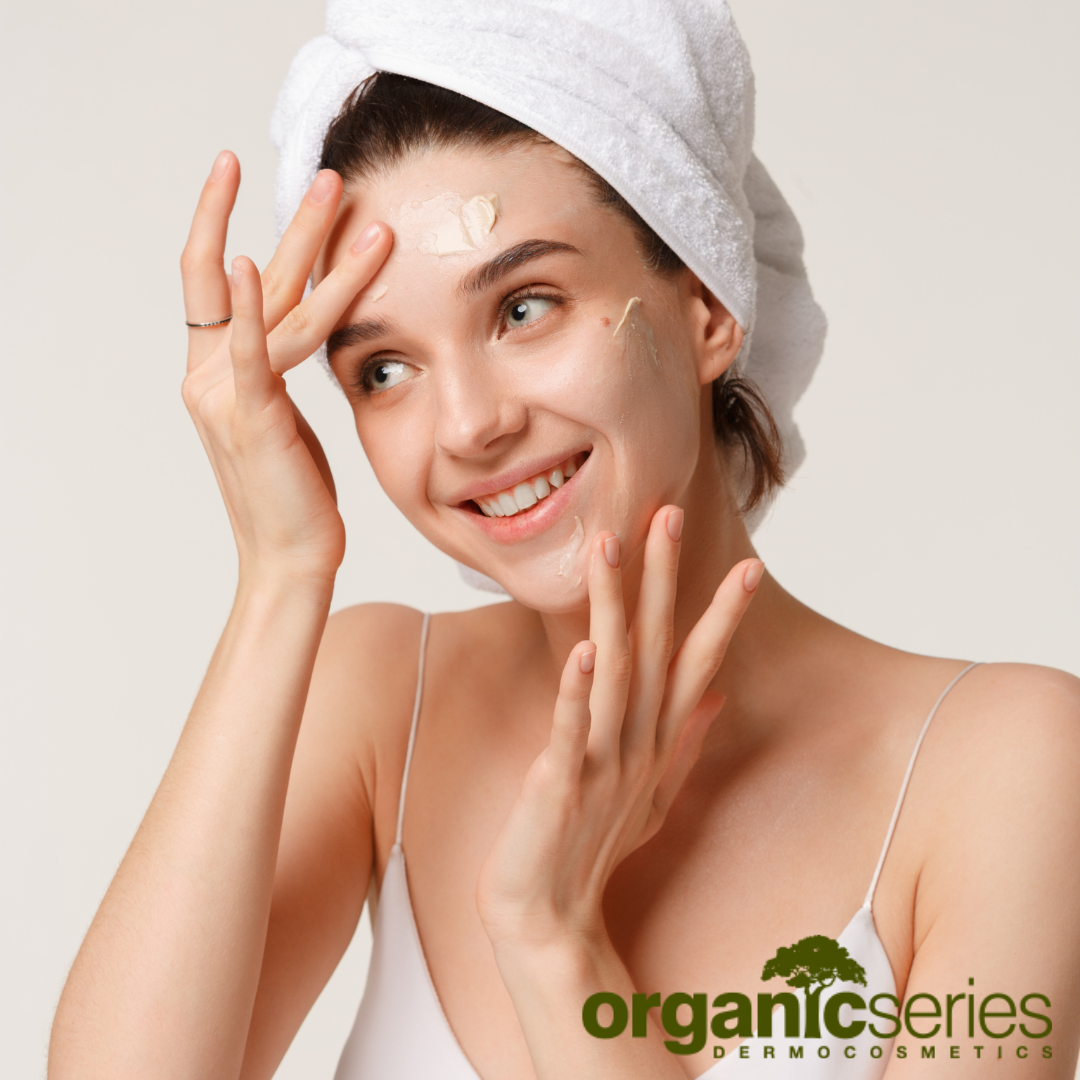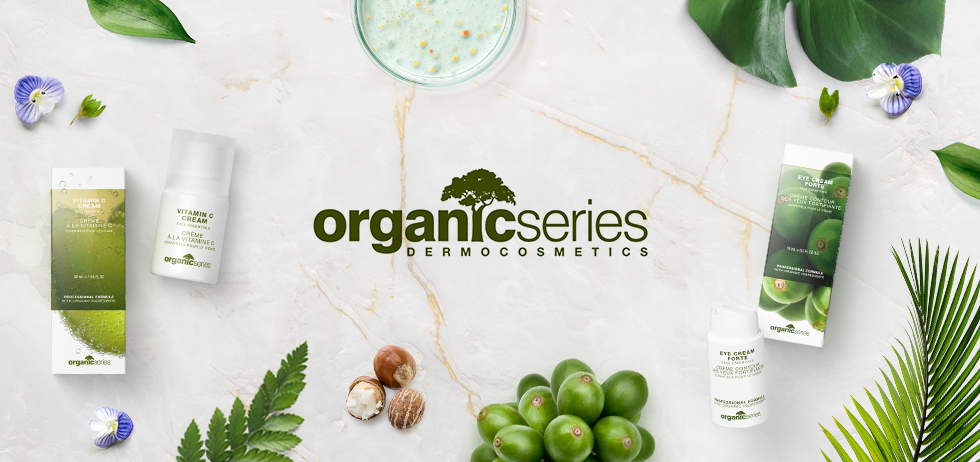Find the best organic acne cream
Dealing with acne can be challenging, but finding the perfect solution doesn’t have to be. Choosing the best organic acne cream can help you achieve clear, healthy skin without exposing it to harsh chemicals or synthetic ingredients. Organic acne creams are specially formulated with natural components to target blemishes, soothe inflammation, and restore your skin’s balance.
If you’re on a mission to find a cream that truly works, you’ve come to the right place. By following these 12 simple steps, you’ll learn how to identify the best organic acne cream for your unique skin type and needs. Let’s dive into this guide to unlock the secrets to clearer, healthier skin.
Step 1: Identify Your Skin Type
The first step to choosing the best organic acne cream is understanding your skin type. Is your skin oily, dry, combination, or sensitive? Knowing your skin type helps you select a product tailored to your specific needs.
For oily skin, look for creams that balance oil production and prevent clogged pores. For dry skin, choose a cream with hydrating ingredients like aloe vera or hyaluronic acid. Sensitive skin? Opt for formulas with calming agents such as chamomile or calendula. Identifying your skin type ensures your organic cream works effectively without causing irritation.
Step 2: Choose Non-Comedogenic Formulas
Non-comedogenic products are essential when dealing with acne. These formulations are designed not to clog pores, making them ideal for acne-prone skin. Many organic acne creams are made with natural, non-comedogenic ingredients like jojoba oil or tea tree oil.
Using a non-comedogenic cream ensures your pores remain clear while your skin receives the nourishment it needs. This step is particularly important for those prone to recurring breakouts, as clogged pores are a major cause of acne.
Step 3: Look for Natural Acne-Fighting Ingredients
Organic acne creams rely on plant-based ingredients to combat breakouts. Key acne-fighting components include tea tree oil for its antibacterial properties, willow bark extract for its natural salicylic acid, and neem for its ability to reduce bacteria and inflammation.
These natural ingredients target acne-causing bacteria, reduce redness, and gently exfoliate your skin. Unlike harsh chemical treatments, they work in harmony with your skin, ensuring long-term benefits without irritation.
Step 4: Avoid Harsh Chemicals and Fillers
One of the primary benefits of choosing an organic acne cream is avoiding harmful chemicals like parabens, sulfates, and artificial fragrances. These additives can irritate your skin, exacerbate acne, and disrupt your skin’s natural balance.
Instead, organic creams use plant-based preservatives and natural scents derived from essential oils. By avoiding harsh chemicals, you’re not only addressing acne but also promoting overall skin health.
Step 5: Ensure Hydration Without Greasiness
Many acne treatments strip the skin of moisture, leaving it dry and irritated. The best organic acne creams strike a balance between hydration and oil control. Ingredients like hyaluronic acid, cucumber extract, and rosehip oil provide hydration without making your skin greasy.
Well-hydrated skin is better equipped to heal and resist future breakouts. A cream that combines acne-fighting properties with hydration ensures your skin stays healthy and radiant.
Step 6: Opt for Soothing, Anti-Inflammatory Ingredients
Acne often comes with redness and irritation, so calming ingredients are a must. Look for organic creams with chamomile, calendula, or turmeric. These natural anti-inflammatory agents help soothe your skin, reducing redness and swelling associated with acne.
By incorporating these calming ingredients, your cream not only addresses acne but also improves your overall complexion, leaving your skin looking and feeling healthier.
Step 7: Check for Antioxidants
Antioxidants protect your skin from environmental stressors and free radicals that can worsen acne. Ingredients like green tea extract, vitamin C, and pomegranate are commonly found in organic acne creams.
These antioxidants work to repair and strengthen your skin, preventing further damage and promoting a clear, healthy appearance. Antioxidant-rich creams are a game-changer for maintaining long-term skin health.
Step 8: Research Organic Certifications
To ensure you’re truly getting an organic product, check for certifications like USDA Organic, ECOCERT, or COSMOS. These labels guarantee the cream meets strict organic standards and contains no synthetic ingredients or pesticides.
Certified organic products give you peace of mind that your acne cream is safe, effective, and aligned with your commitment to natural skincare.
Step 9: Consider Texture and Absorption
The texture of your acne cream can make a big difference in your skincare routine. Lightweight creams are perfect for daytime use, while richer formulas may work better at night.
A fast-absorbing cream ensures that your skin feels comfortable and non-greasy throughout the day. By selecting a texture that suits your routine, you’ll be more likely to use the product consistently, leading to better results.
Step 10: Read Customer Reviews
Customer feedback is a valuable resource when searching for the best organic acne cream. Reviews from individuals with similar skin types and concerns can help you understand how a product performs in real-life scenarios.
Look for creams with consistently positive feedback regarding effectiveness, texture, and long-term results. Reviews can also alert you to any potential downsides, helping you make an informed decision.
Step 11: Consult a Skincare Expert
If you’re unsure which organic cream to choose, consulting a dermatologist or skincare professional can provide personalized guidance. They can recommend products with specific ingredients that match your skin’s needs.
A professional consultation ensures your chosen cream complements your overall skincare routine and addresses the root causes of your acne.
Step 12: Test Before You Commit
Patch testing is crucial when trying any new product. Apply a small amount of the cream to a discreet area of your skin and monitor for 24 hours. This step ensures the product won’t cause irritation or allergic reactions.
By testing before committing, you can confidently introduce the cream into your routine, knowing it’s safe and effective for your skin.
Conclusion
Finding the best organic acne cream doesn’t have to be overwhelming. By following these 12 steps, you can identify a product that not only treats acne but also supports your skin’s overall health.
Choose a cream tailored to your skin type, enriched with natural ingredients, and free from harsh chemicals. With the right product, you’ll be on your way to clearer, healthier skin in no time. Prioritize quality and consistency, and let your organic acne cream transform your skincare journey.
How is organic acne cream better than nonorganic?

Organic acne creams are a better choice than nonorganic products as they are free of harsh chemicals and toxins which can be irritating to the skin. Organic ingredients also tend to be more gentle and nourishing, helping your skin retain its natural moisture balance while still providing an effective treatment for breakouts. Additionally, organic creams often contain additional plant-based ingredients that can help reduce inflammation and soothe skin irritation. Finally, if you care about the environment, then organic acne cream is the only option, as these products are based on sustainable and pesticide-free farming and are never tested on animals.
In general, organic acne creams are a gentler option than nonorganic products which may contain harsh chemicals or irritants that could worsen your condition.
The bottom line is that when it comes to treating acne, an organic acne cream can be a safe, natural and effective alternative to traditional treatments. With the right ingredients, it can help reduce inflammation, heal skin and prevent future breakouts. So if you’re looking for an organic solution that keeps your skin healthy without harsh chemicals or irritants, try organic acne cream today!
What ingredients should I look for when selecting an organic acne cream?
When looking for an organic acne cream, it is important to choose one that contains natural ingredients such as tea tree oil, shikimic acid or azeloglycine as well as useful plant oils and herbal extracts. These ingredients are known to have anti-inflammatory and antimicrobial properties that can help soothe the skin and reduce breakouts. Additionally, look for creams that contain vitamins A, C, E or other antioxidants as these may help protect the skin from further damage caused by free radicals. Finally, make sure to select a product that is free of harsh chemicals and fragrances as these can further irritate the skin.
Organic acne creams are an effective, natural and affordable way to treat breakouts without using harsh or synthetic treatments. With the right ingredients, you will be able to reduce inflammation and heal your skin for a healthier, smoother complexion.
What ingredients to avoid in acne skincare?

When selecting skincare products for acne prone skin, it is important to avoid certain ingredients that are known to irritate the skin and clog pores. Some of these ingredients include mineral oil, lanolin, fragrances, dyes and preservatives. Additionally, stay away from comedogenic (pore-clogging) oils such as coconut oil and cocoa butter. Say no to alcohol – many toners and astringents contain alcohol, which can dry out your skin, making it more prone to breakouts. Instead opt for gentle cleansing agents such as hyaluronic acid or aloe vera.
Lastly, be sure to read the label of any skincare product you use and if you are unsure about an ingredient, it is best to look it up or ask a dermatologist before continuing use. By avoiding these ingredients in your acne skincare routine, you can help keep your skin clear and healthy!
How to use organic acne cream?
Organic acne cream can be applied once or twice a day after cleansing your skin. Gently massage the product into the affected area until fully absorbed. It is important to avoid overusing any kind of acne product as this may lead to skin irritation or dryness. For best results, use the organic acne cream in combination with other organic products that are specifically designed for acne-prone skin.
Making sure to take good care of your skin is essential for preventing further outbreaks and keeping your complexion looking clear and healthy! With the right products and a little patience, you can achieve beautiful, blemish-free skin.
Good luck on your journey to clear skin! With organic acne cream, you have a natural and safe alternative to traditional treatments that can help keep breakouts at bay. Give it a try and see the results for yourself!
What are the ultimate 13 pro skincare tips for acne prone skin?

- Use gentle, non-irritating cleansers: Choose a cleanser that is mild and free of fragrances, dyes and other irritants. Look for ingredients such as aloe vera or chamomile which can help soothe the skin without drying it out.
- Exfoliate regularly but gently: Exfoliation is an important part of skin care and can help reduce the buildup of dead skin cells that can cause acne breakouts. However, it’s important to use a gentle exfoliant that won’t aggravate your skin.
- Avoid picking at pimples: Picking or squeezing pimples can damage your skin and increase the risk of scarring. It also increases the risk of infection by introducing bacteria to your skin.
- Use an silicone-free moisturizer: Choose a moisturizer that is lightweight and silicone-free so that it won’t clog pores or irritate your skin. Look for ingredients such as hyaluronic acid which can help keep your skin hydrated without causing breakouts.
- Use a sunscreen: Exposure to the sun’s UV rays can increase the risk of acne breakouts and make existing pimples worse. Make sure to use a sunscreen that is non-comedogenic (won’t clog pores) and has SPF protection.
- Don’t over cleanse: Washing your face too often can strip your skin of its natural oils, leaving it feeling dry and irritated. Stick to cleansing your face twice a day with a gentle cleanser and don’t forget the sunscreen!
- Eat a healthy diet: Eating a diet rich in fruits, vegetables and healthy fats can help give your skin a boost and reduce the risk of acne. Try to avoid too much sugar as this can cause inflammation, which can lead to breakouts.
- Stay hydrated: Drinking plenty of water helps to keep your skin hydrated and promote cell turnover, both important for healthy skin. Aim to drink at least 8 glasses of water per day.
- Avoid harsh products: Using harsh toners, scrubs or bleaching creams can irritate your skin and cause more breakouts. Stick to gentle products that are free of fragrance and dyes as these tend to be less likely to irritate your skin.
- Use a topical retinoid: Retinoids can help reduce the appearance of acne by unclogging pores and reducing inflammation. Talk to your doctor or dermatologist to find out if a prescription retinoid is right for you.
- Spot treat pimples: When treating individual pimples, use an over-the-counter acne cream with salicylic acid or benzoyl peroxide. Apply it directly to the affected area until fully absorbed and be sure to follow the instructions on the package for best results.
- Manage stress: Stress can worsen acne breakouts, so take some time out of your day to relax and unwind. Try activities such as yoga, meditation or breathing exercises to help reduce stress levels and give your skin some TLC.
- Visit a dermatologist: If you’re struggling with acne despite trying different treatments, it might be time to visit a dermatologist for professional advice. They will be able to provide more targeted treatment tailored specifically to your skin type.
Following these 13 skincare tips for acne prone skin can help keep breakouts at bay. With some patience and dedication you’ll be on your way to clear, beautiful skin that glows from within!
Organic Acne Skincare Routine
1. Cleanse
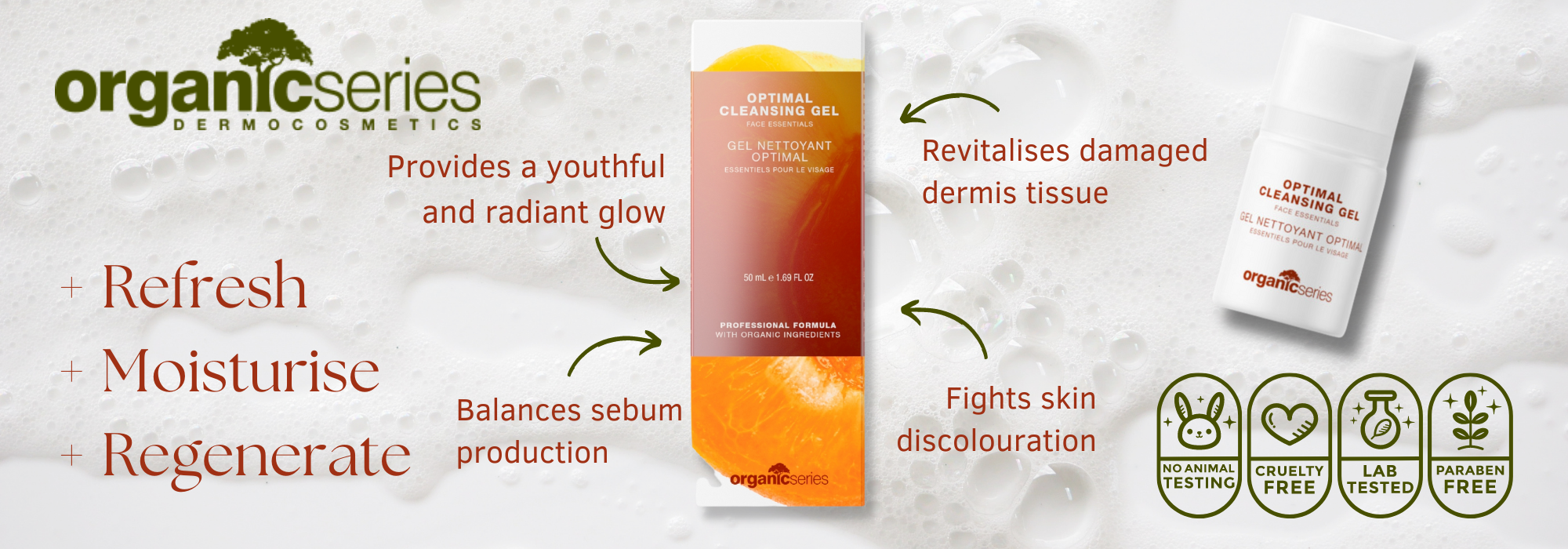
Firstly, start with a professional cleanser – our Optimal Cleansing Gel is an exceptional remedy to banish all the impurities stuck in the deep layers of the skin. As a plant-based formula, the gel gracefully cleanses the skin and leaves a healthy-looking effect on your facial skin. This exclusive blend of valuable plant extracts with deep cleansing properties is recommended for daily evening and morning use. The delicate formula effectively removes make-up, sebum, and impurities, while restoring the skin’s proper moisture level. This cleansing gel perfectly cleanses, nourishes and soothes the skin, leaving it smooth, soft and refreshed.
2. Exfoliate
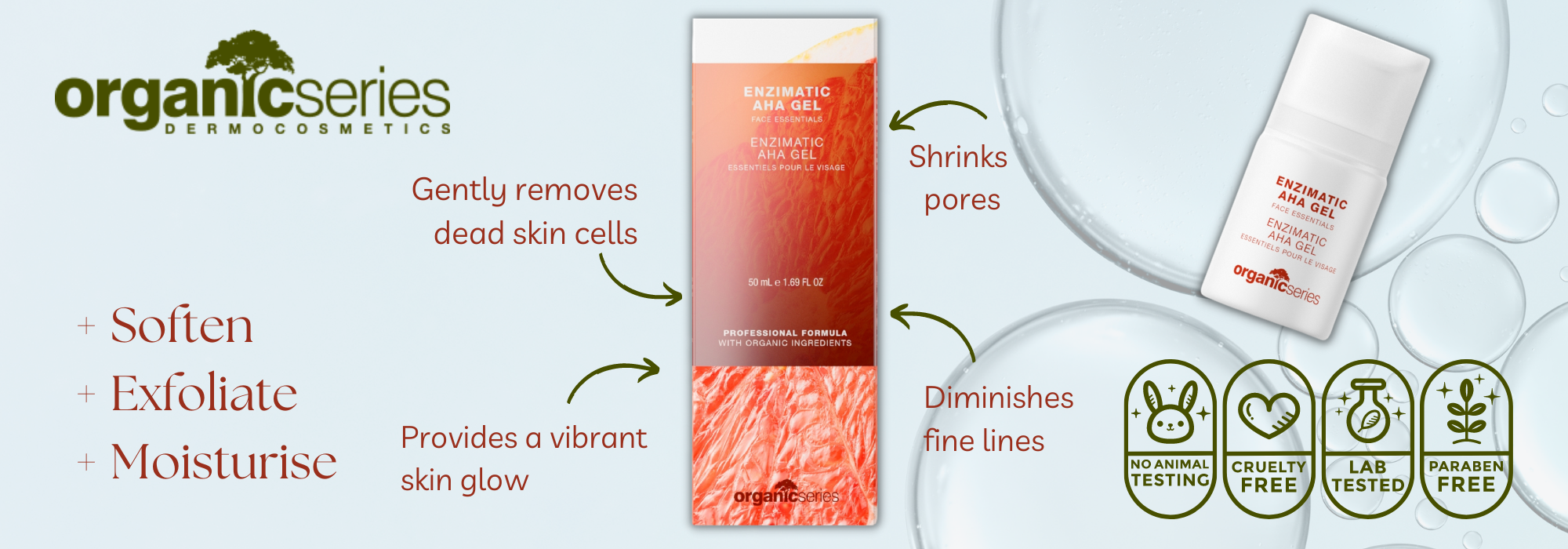
Every other day, after cleansing, it’s a good idea to do a gentle exfoliation treatment – our Enzymatic AHA Gel is the ideal option for this. Enzymatic AHA gel derives its extremely delicate exfoliating properties from a botanical mix of pineapple, hibiscus and grapefruit. It has an antibacterial and anti-inflammatory effect and removes excess sebum accumulation. After application, the skin will be perfectly smoothened, thoroughly cleansed and illuminated.
3. Tone
Tone your freshly cleansed skin with our Oil Control Toner to regulate sebum production and help fight acne. The degreasing and non-sticky Organic Toner for Oily Skin effectively combats all kinds of skin complications. It keeps a check on the excessive sebum production and averts the appearance of new inflammation and blackheads. Contains natural extracts that reduce skin irritation whilst cleansing the skin of its impurities. Rejuvenates the skin and improves the protective barrier to fight off natural radicals. It can refresh and brighten up the skin’s natural complexion without stripping out skin’s natural moisture.
4. Add a serum
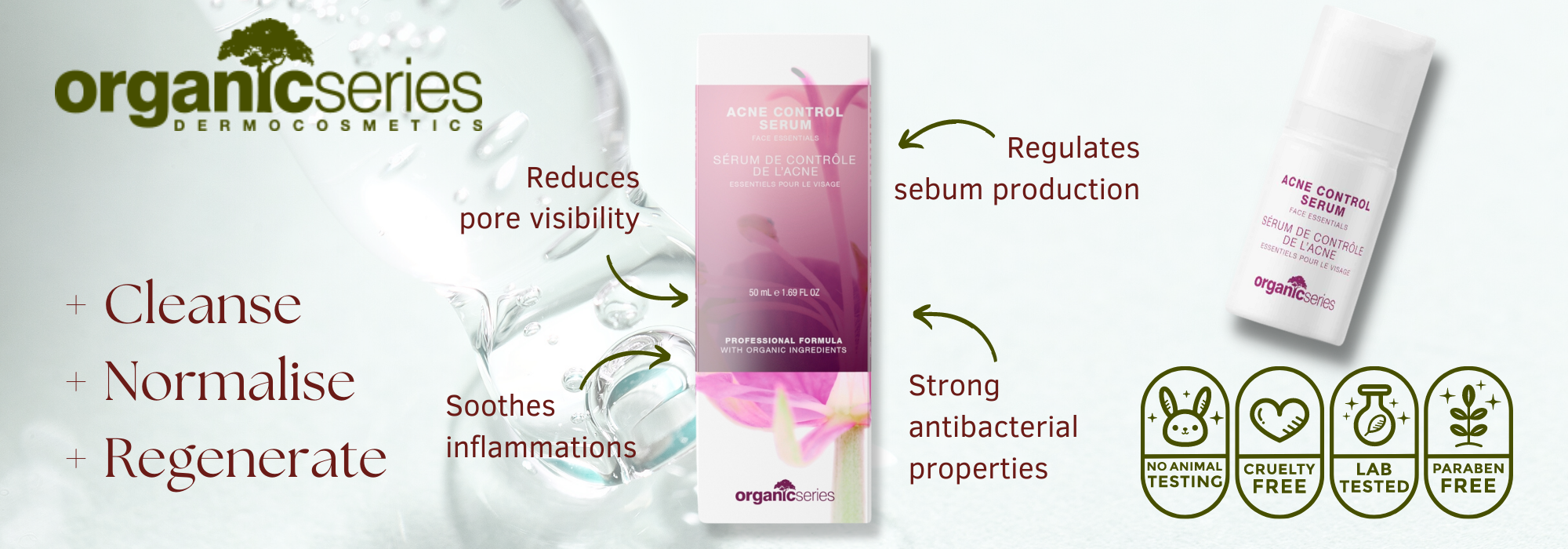
For maximum results, a good serum is a must. Our Acne Control Serum has an effective antibacterial effect. It regulates the sebaceous glands and reduces sebum secretion and the amount of inflammatory lumps. It will make your skin look radiant, smooth, regenerated and perfectly moisturised. Thanks to a unique combination of active ingredients, it will influence the regulation of sebaceous glands. The serum has a strong anti-inflammatory, anti-acne and antifungal properties. Additionally, the serum will alleviate redness, irritation and inflammation and normalise the process of epidermis exfoliation.
5. Finish off with a cream
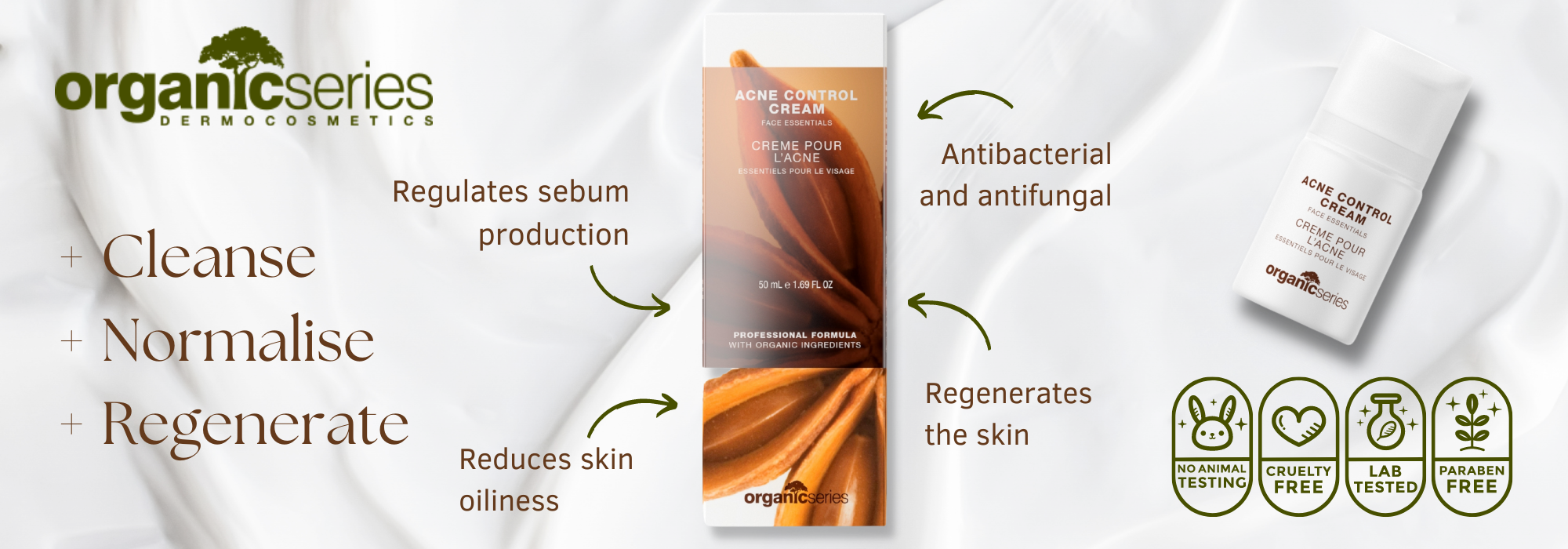
The last step of the basic acne skincare routine is the cream. Our Acne Control Cream contains shikimic acid which directly affects the composition of sebum and has an antibacterial and antifungal effect. It will effectively inhibit the development of Propionibacterium Acnes, the bacteria responsible for acne changes. It will regenerate the skin from photodamages and discolorations, leaving it luminously smooth. Azeloglycine will significantly reduce oily skin and regulate the sebaceous glands. It will reduce TEWL (transepidermal water loss) and make sure the skin remains perfectly hydrated and silky smooth.
More inspiration
Follow Organic Series UK on instagram and facebook for more inspiration, expert tips and special discount codes!

